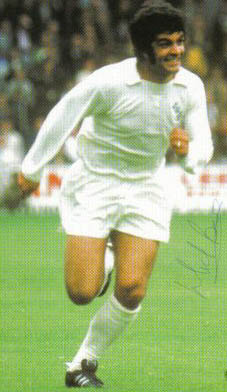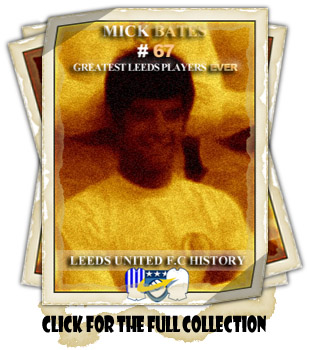

Bates: Michael John (Mick)
1964-1976
(Player Details)
Midfield
Born: Armthorpe, Doncaster: 19-09-1947
Debut v Hartlepools United (h) (League Cup): 22-09-1965
5’7” 10st 7lb (1975)
#67 in 100 Greatest LUFC Players Ever

Born in Armthorpe, he attended Danum Grammar School, becoming a Yorkshire Schools
player, who had trials for England. He signed for Leeds in September 1964 after
serving his apprenticeship. Maybe Mick Bates was too modest for his own good. A
neat and stylish left-sided midfielder, unquestionably of First Division calibre,
he spent twelve years at Elland Road in the shadows of Billy Bremner and Johnny
Giles, playing as a stop-gap, though often with distinction when called upon
because of either injury to his mentors or Don Revie's calculated game plan.
However well he might perform, the equable Bates, who played over one hundred and
fifty times in all competitions, generally accepted that he would be restored to
the Reserves when Leeds United's master schemers were fit. It was not his way to
knock on the Manager's door in a fit of pique when up the teamsheet went and he
saw his name was excluded. How Bates might have developed if he had chosen to leave
Leeds is open to question. He could have commanded a regular First Division spot
elsewhere, and United turned down one such offer of £100,000 from Southampton, but
he remained loyal to Leeds. While an excellent passer of the ball, he lacked,
despite his best efforts, the quality and vision of Bremner and Giles, though the
latter helped iron out faults in Bates' game, among them a tendency to chase the
ball around the field and become exhausted long before full-time. Mick Bates also
scored remarkably few goals for a midfielder. He scored just four in one hundred
and twenty-five League appearances. Bates' contentment at merely being part of
English football's finest squad and the lack of a mean and hungry streak confined
him to the fringes of great things. Not being noted as a goal-scorer, the one he
got in the 2-2 draw at Juventus in the First Leg of the Inter-Cities Fairs Cup Final
of 1971 was priceless because with his first kick, he scored an away goal, which
eventually ensured that United lifted the trophy on the away goals rule. In the
1973-74 championship season, he missed out on much of the run-in after tearing his
cartilage on an icy pitch on 1st December 1973 in a 2-2 draw with Queens Park
Rangers at Elland Road. He finally recovered and was back in the side early in the
1974-75 season, but damaged the same knee in a pre-match warm-up. He played on
through that game, but the damage had been done and he was out for the rest of the
season. He was poised for a comeback in a pre-season game that summer, but his knee
went again and he had a final operation which revealed his cartilage had been split
across the middle. So, it was back to the physiotherapist to recover, and he didn't
return to the first team until February 1976, two years after the original injury.
He served United for twelve years and was a vital cog in the footballing machine
that Don Revie had assembled and kept together. However, as Revie's great side
disintegrated in the mid 1970's, Mick Bates went with it, transferring to Walsall
in June 1976 for £25,000, where, still only twenty-nine, he became captain. He
stayed for two seasons, scoring four goals in eighty-five League appearances,
including one as a substitute, before returning to Yorkshire and Bradford City in
June 1978 for £20,000. After scoring once in fifty-four League starts and two more
from the bench, he returned to his hometown team, Doncaster Rovers, in June 1980.
He made his debut in the first game of the 1980-81 season, as a substitute, in a
0-3 defeat at Port Vale on 16th August 1980. His first start came in the 2-0 win
over Darlington at Belle Vue, three days later. He stayed at Doncaster until June
1981, when after only three League starts and one substitute appearance, he joined
former Leeds team mate Rod Belfitt at Bentley Victoria and later played for Worksop
Town. He lived in Bentley, working as a steward of a Working Mens Club. He then ran
his own Insurance business for twenty-one years and retired in 1999.